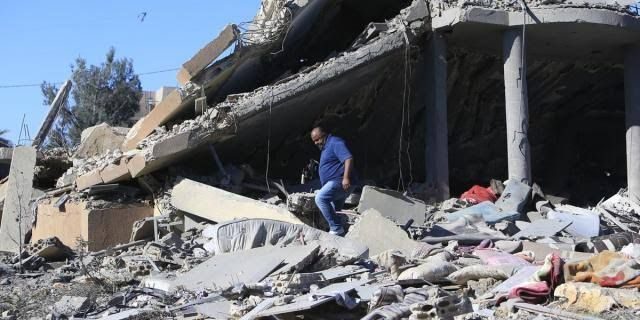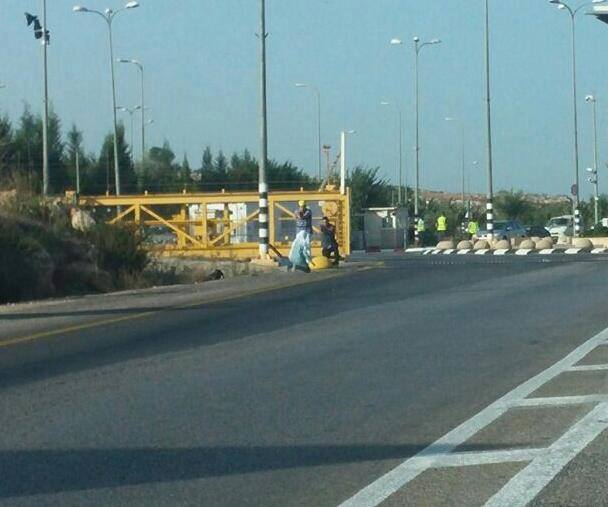
Officials are worried Israel is seeking U.S. weapons for a war in Lebanon, and analysts say an uptick in attacks tied to Iran risks ensnaring the U.S. in a major conflict, HuffPost reported.
One week into the resumed Israeli military campaign in Gaza, U.S. officials and foreign policy experts are increasingly afraid Israel’s operation will fuel a broader conflict, drawing in Lebanon and expanding throughout the Middle East, potentially forcing American troops into the fight.
Biden administration officials at multiple government agencies have in recent days expressed concerns that Israel may be seeking American military aid for fighting in Lebanon, two U.S. officials told HuffPost.
Such a step would mark a major escalation, almost certainly proving extremely deadly for civilians in both Lebanon and Israel. It could also force a confrontation with Iran, a regional heavyweight that backs the powerful Lebanese militia Hezbollah.
Officials were briefed on the Lebanon concerns before a Tuesday afternoon meeting of top policymakers from across the national security establishment, one official said. HuffPost interviewed multiple U.S. and foreign officials who were not authorized to speak on the record.
“This last week, the level of concern in D.C. about a potential war on the Israel-Lebanon front has gone up three or four notches,” said Randa Slim, a senior fellow at the Middle East Institute think tank.
Israel’s possible actions in Lebanon would be just the latest kindling for a major Mideast conflagration, following a string of attacks tied to Iran against U.S. troops in the region
Last Sunday, a U.S. Navy warship and commercial vessels in a crucial global waterway near Yemen faced drone and missile strikes from an Iran-linked Yemeni armed group known as the Houthis that sparked an hours-long firefight, and on Wednesday an American destroyer shot down a Houthi drone.
The Houthis have publicly said Israel’s moves in Gaza are motivating their assault, and the U.S. is now considering options for a show of force against the Houthis, officials say. The Pentagon has documented dozens of attacks against American forces throughout the Middle East, including in Iraq and Syria, in recent weeks. The Syria and Iraq incidents were discussed at the Tuesday meeting, according to a U.S. official.
And the source of much of the tension across the region ― the extremely high toll of Israel’s Gaza operation, which has killed two civilians for every militant, for a total death toll of more than 16,000 so far ― is far from abating. Despite repeated calls for Israeli restraint from senior figures in the Biden administration, U.S. intelligence assesses the Israel Defense Forces (IDF) are committed to “business as usual,” with only limited concern about civilian casualties, a U.S. official said, and there are suspicions the renewed campaign is actually bloodier than the previous offensive in northern Gaza.
“Humanitarian organizations are ringing the alarm bell more than they ever have during the conflict” in talking to the State Department, an official in the department said. Those aid groups are telling diplomats they may need to wind down their operations in Gaza given the heavy fighting, which would make the situation “dramatically worse,” the official said, on top of shortages of food and a rampant spread of disease among the 1.9 million Gazans forced out of their homes since Israel began its offensive in retaliation for an Oct. 7 attack by the Gaza-based group Hamas.
Residents and civil defense teams conduct a search-and-rescue operation Wednesday amid the rubble of a building that collapsed following an Israeli attack on houses belonging to the Abu Hubeyze and Abu Ayesha families at the Nuseirat refugee camp in Deir al-Balah, Gaza.
State Department spokespeople did not respond to requests for comment for this article. A White House official told HuffPost the Tuesday meeting of top officials did not include discussion of the Lebanon concerns.
Another State Department official told HuffPost: “This is a pivotal moment in history, and we should feel angry about how [Israeli Prime Minister Benjamin] Netanyahu has literally put our reputation on fire to advance his personal political agenda. The collateral effects to American security are extremely consequential.”
Netanyahu’s security failures are widely blamed for the assault on Israel, and he is expected to resign at the end of the war. He is also facing criminal charges that could land him in jail.
A third State Department official voiced frustration with recent news articles suggesting the U.S. is encouraging Israeli caution and similar public statements, arguing: “It just feels like patting ourselves on the back while it increasingly seems like the IDF are waging a campaign of ethnic cleansing.”
Netanyahu and some of his lieutenants, notably Israeli Defense Minister Yoav Gallant, have repeatedly suggested combating Hezbollah in Lebanon as part of Israel’s response to the Oct. 7 Hamas attack and hostage-taking. Analysts believe the Israeli government could count on that move to distract from their controversial Gaza operation, which has seemingly had little major success in weakening Israel’s enemies.
“There is a will on the Israeli side to take advantage of the current rise in tensions to change the realities on the ground… to push Hezbollah far from the Israeli border,” a European diplomat told HuffPost, pointing to Israel’s evacuation of tens of thousands of citizens away from communities near Lebanon.
The diplomat sees comments by Israeli officials and some of their supporters as encouraging a wider blow-up that could have huge consequences.
“There is a concerning return of the clash-of-civilizations rhetoric, which tends to dehumanize the peoples of the region” and create the impression of “a values-based war,” the diplomat said. They noted Israeli President Isaac Herzog’s recent statement that the war on the Palestinian territory of Gaza is meant “to save Western civilization.”
Such comments shift focus away from fundamental reasons for bloodshed, like the decades-long international failure to craft an Israeli-Palestinian deal that addresses Palestinian aspirations, they continued, fueling cycles of violence.
“The fact that the Americans and Europeans just … gave up, in a way, means we’re giving an opening for actors like Iran to embrace the cause and turn it into” a rallying cry, the diplomat said. “In the Middle East, there is a constant failure of U.S. policy: It’s been relying almost exclusively on military interventionism, and there has been no accountability for many of these failed policies ― the 2003 Iraq War being maybe the biggest blunder among all of this ― so now you’re seeing a multiplication of non-state actors fighting a Western military presence, which just leads to more military options being put on the table.”
Anxiety around Lebanon, which is home to 5.5 million people and is already experiencing a major economic crisis, is dominating conversations among Middle East watchers.
Randa Slim highlighted recent remarks by the Israeli defense minister and references by Israeli officials to a United Nations resolution requiring Hezbollah to leave parts of southern Lebanon, which the militia has not done.
“This is definitely Israel testing the waters, and they are seeing, ‘How will the international community react?’” the analyst said. “They care about the Saudis, the Emiratis and the Americans… if these three countries mount a joint pushback against this idea, then Israel can be dissuaded from going forward. But it’s very clear that there is a plan, and the groundwork is being prepared for implementation.”
Israel and Hezbollah last fought a war in 2006. Following Oct. 7, they have had their worst direct fighting since, with Israel conducting artillery and air strikes within Lebanon and Hezbollah targeting Israeli positions almost every day. The clashes have killed about 100 people in Lebanon, including civilians and journalists.
Within the Biden administration, officials this week privately connected their Lebanon fears to a lack of clarity from Israel’s Ministry of Defense about what it plans to do with U.S. weaponry, a U.S. official told HuffPost. Israel receives more than $3 billion in military aid each year, and Congress is weighing a Biden administration proposal to send the country more than $10 billion in additional military support.
The limited details on Israeli intentions are making it harder for the administration to negotiate that package with lawmakers, the U.S. official said. Dozens of legislators have said they are unhappy with Israel’s conduct in its Gaza operation, and on Thursday, 13 senators, led by Democrat Chris Van Hollen of Maryland, introduced a bill to add more conditions on military aid flowing to foreign countries to ensure the support does not enable violations of international humanitarian law. Human rights groups have accused Israel of repeatedly committing war crimes in its Gaza campaign, including with U.S. equipment.
“We did ask for a breakdown of where this aid is all going, and the administration wasn’t able to provide that for us,” a Senate aide told HuffPost. “Probably because they don’t want to admit that they are essentially writing a blank check and that they don’t know where it’s going.”
The aide sees this week’s Israeli killing of a Lebanese soldier as a warning sign. Israel expressed “regret”; many observers saw the incident as proof the tense situation could quickly spiral into all-out war.
“We should be putting more pressure on the Israelis to not engage in Lebanon in unhelpful ways,” the aide continued, calling the Lebanese Armed Forces ― one of the few relatively respected institutions in the country ― “the one force that’s been somewhat helpful in minimizing the spread of this conflict… not only in keeping Hezbollah at bay but also helping to provide a measure of security in the region, for us specifically in protecting the U.S. Embassy [in Beirut] from protests when the situation could have escalated really quickly.”
The European diplomat said the prolonged tension means there are “many occasions for blunders,” saying that, for instance, regardless of whether Israel had meant to kill journalists in Lebanon, “certainly preserving journalists’ lives does not seem like a high priority.” On Thursday, AFP and Reuters published investigations blaming Israel for an Oct. 13 strike that killed a Reuters reporter and hurt six other journalists.
Though European governments want to forestall a bigger war ― and have tools they can use, unlike Washington, such as diplomatic ties with Iran and sustained contact with some militant groups ― “ultimately it’s the Americans who are really calling the shots,” the diplomat continued.
Slim sees the Biden administration as key to stopping a Lebanon war and yet being insufficiently assertive about that priority so far.
Hezbollah has shown it does not want a more intense fight, she said. Had it sought that outcome, it might have carried out disproportionate attacks on Israel or taken steps such as kidnapping Israelis or striking Israeli targets abroad.
“If Israel decides they want to go for it… it’s going to be costly,” Slim said, describing Hezbollah as stronger now than it was in 2006 and willing to bombard major Israeli cities and infrastructure. She also predicted that Israel would pay a price globally by being seen as “the aggressor” and that Hezbollah’s allies would retaliate against both Israeli and U.S. targets.
On Thursday, U.S. diplomats in Jerusalem described how deeply the current Gaza war has already hurt Israel’s economy, writing to the State Department in a diplomatic cable viewed by HuffPost.
“I don’t know if Israel can afford going forward, especially with a [U.S.] administration that has given them unconditional support so far in their war against Hamas and made it clear to them that an expansion of the war is not something this administration wants,” Slim said. “For Israel now to do this … is like stabbing [President Joe Biden] in the back.”
She thinks the U.S. should establish “a red line” to dispel Israeli expectations of American assistance regardless of Israeli policies.
“Israel has taken for granted that if the conflict were to expand, U.S. aircraft carriers in the Mediterranean are going to come to the rescue. The administration needs to make it clear that if Israel decides to expand this war, then they are going to be left on their own,” Slim said.
A greater crisis could be triggered thousands of miles away from Israel’s borders.
Experts tracking Iraq, home to a number of well-armed militias and hundreds of U.S. and allied troops focused on the Islamic State group, see an attempt by local forces to “out-radical” each other in their response to the Gaza conflict.
And Yemen’s Houthis are a wild card given that they gained serious influence only a decade ago. They are little understood by most governments and have few links with international players who often try to prevent instability.
“Everyone continues to underestimate the recklessness of the Houthis,” said Farea Al-Muslimi, a research fellow at the Chatham House think tank.
He would not be surprised if the militia targeted regional countries that have ties to Israel, such as the United Arab Emirates ― which the Houthis have struck before ― or Bahrain. The Gaza war has already undercut attempts to end the Yemen civil war between the Houthis and U.S.-backed forces, he noted, forcing the postponement of scheduled October talks in Saudi Arabia that could have replaced a shaky truce with a real peace deal.
The Saudis are likely best positioned to persuade the Houthis to avoid an escalation given the Yemen militia’s interest in avoiding renewed Saudi bombing in their country, Al-Muslimi said, so the U.S. could push Riyadh to firmly convey that message.
Yet the Biden administration has consistently been reluctant to use its leverage over Saudi Arabia as Biden’s leading Middle East adviser, Brett McGurk, has focused on deepening U.S. ties to the kingdom and convincing it to establish relations with Israel.
A congressional aide pointed to the U.S.’s recent approval of a nearly $600 million military surveillance aircraft deal for Saudi Arabia, which the aide said Biden granted without using it to secure anything from the Saudis in terms of addressing Palestinian frustrations or promising not to violate human rights norms with American equipment.
“They just process it through as if it’s any other day of the week,” the aide said.



